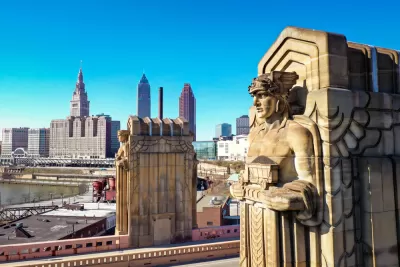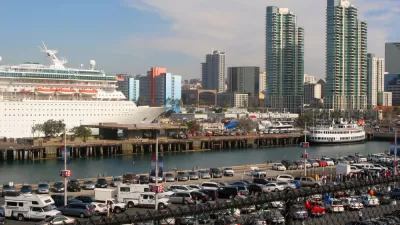Transit oriented parking reform has arrived in Cleveland.

Cleveland is the latest U.S. city to join the parking reform movement, by removing minimum parking requirements for new development located within a quarter mile of transit stops with bus or train service every 15 minutes.
“Currently, owners of new projects must build off-street parking or obtain a zoning variance, city planner Matt Moss told Signal Cleveland. City code requires one parking space per new housing unit. Businesses’ parking mandates are tied to square footage and the number of employees,” reports Nick Castele.
“Under the new scheme, developers would skip the parking requirement and instead invest in other forms of transportation – such as bike parking, transit passes for tenants or pro-pedestrian streetscape improvements. Cleveland’s City Planning Commission would review developers’ proposals,” adds Castele.
According to Castele, the parking reforms are part of Cleveland Mayor Justin Bibb’s push for a 15-minute city approach to transportation and land use, prioritizing transit oriented development and walkability over automobile dependency and car-centric planning and land use patterns.
Cleveland Planning Director Joyce Pan Huang is also cited in the article, describing how parking requirements have contributed to sprawl.
FULL STORY: Cleveland to scrap parking requirements near frequent public transit stops

Trump Administration Could Effectively End Housing Voucher Program
Federal officials are eyeing major cuts to the Section 8 program that helps millions of low-income households pay rent.

Planetizen Federal Action Tracker
A weekly monitor of how Trump’s orders and actions are impacting planners and planning in America.

Ken Jennings Launches Transit Web Series
The Jeopardy champ wants you to ride public transit.

California Invests Additional $5M in Electric School Buses
The state wants to electrify all of its school bus fleets by 2035.

Austin Launches $2M Homelessness Prevention Fund
A new grant program from the city’s Homeless Strategy Office will fund rental assistance and supportive services.

Alabama School Forestry Initiative Brings Trees to Schoolyards
Trees can improve physical and mental health for students and commnity members.
Urban Design for Planners 1: Software Tools
This six-course series explores essential urban design concepts using open source software and equips planners with the tools they need to participate fully in the urban design process.
Planning for Universal Design
Learn the tools for implementing Universal Design in planning regulations.
Ada County Highway District
Clanton & Associates, Inc.
Jessamine County Fiscal Court
Institute for Housing and Urban Development Studies (IHS)
City of Grandview
Harvard GSD Executive Education
Toledo-Lucas County Plan Commissions
Salt Lake City
NYU Wagner Graduate School of Public Service





























